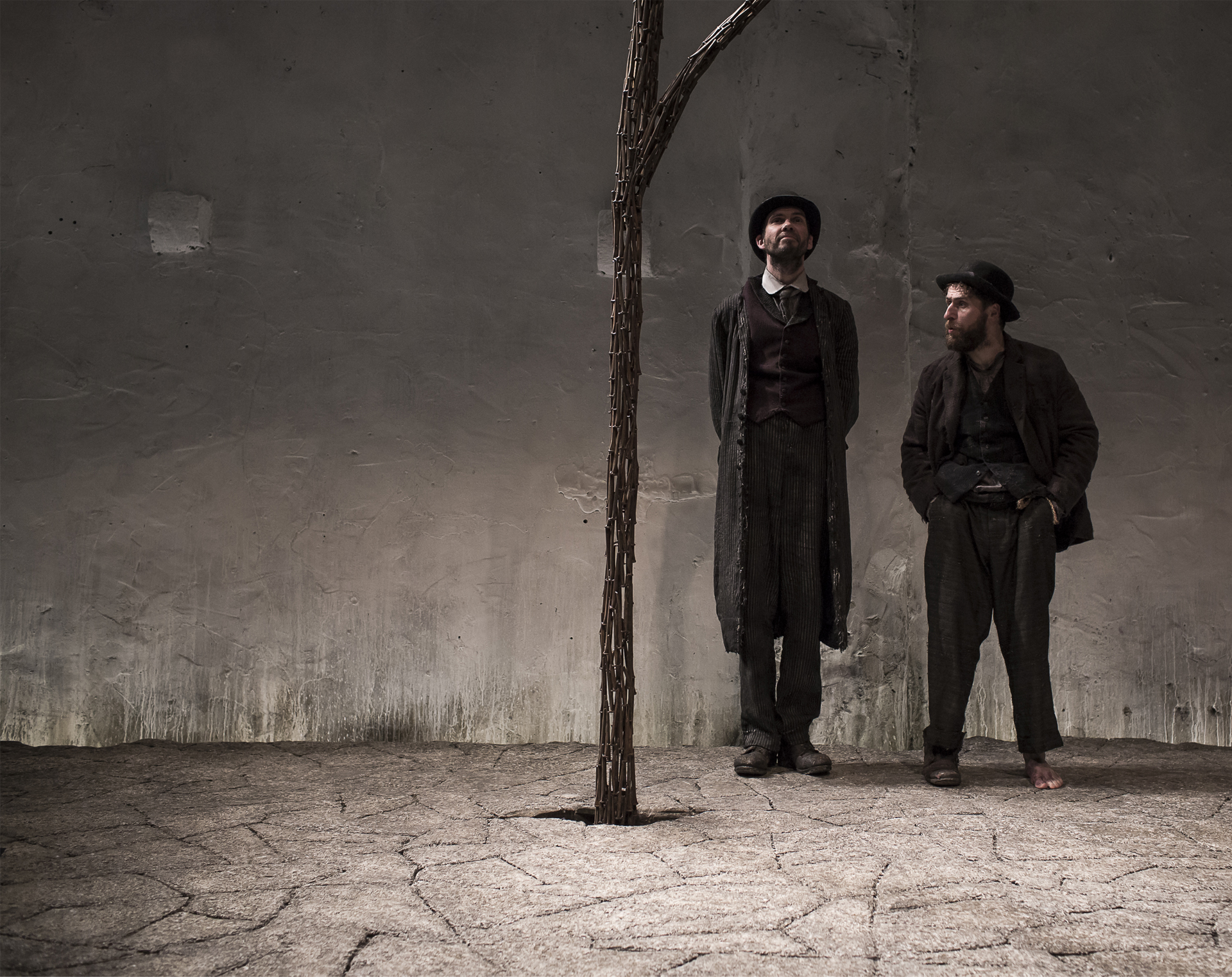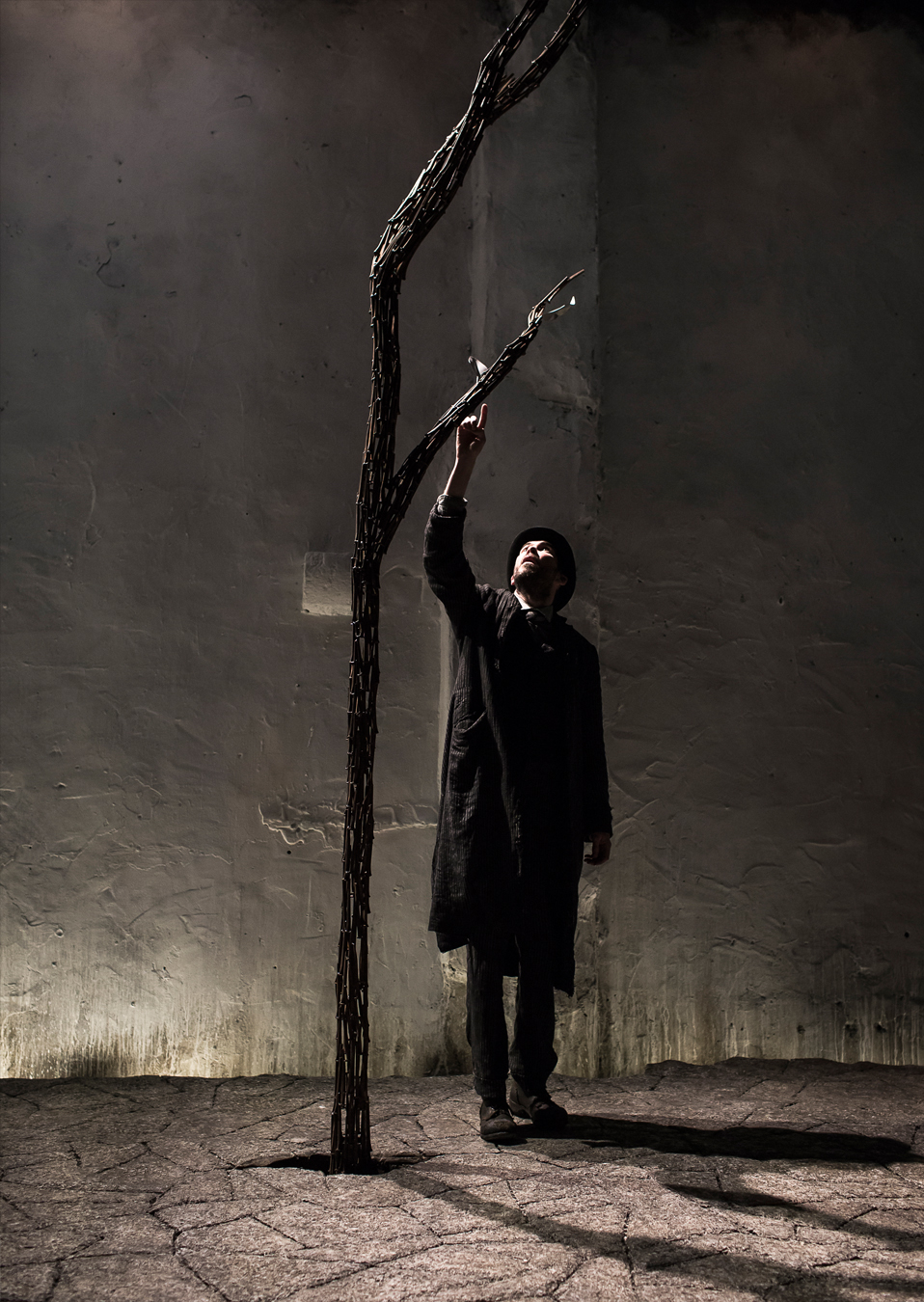Waiting for Godot

Marty Rea as Vladimir and Aaron Monaghan as Estragon in Druid’s production of Waiting for Godot by Samuel Beckett directed by Garry Hynes, photography: Matthew Thompson, photograph courtesy of Druid, 2018
The meaning of life
By Anita Twaalfhoven
A person waiting for a lab result sometimes feels as if time is crawling by at an exasperatingly slow pace. How do you kill time in a waiting room? What thoughts go through your head? When will the doctor appear and what will the outcome be? Samuel Becket portrays this vague state of waiting in his world-famous play Waiting for Godot.
‘Country road. A tree. Evening.’ That is the place where two of the play’s characters – Vladimir and Estragon – are waiting for an unknown person named Godot. The two men are old acquaintances who encounter each other again at this spot. One of them can’t get his swollen foot out of his boot, and the other tries to help him. In the process they philosophise about life: ‘There's man all over for you, blaming on his boots the faults of his feet.’ Like people in a waiting room carrying on a conversation about what the matter is and how to deal with it.
It’s a story full of absurd conversations between two men in bowler hats about waiting for a stranger, in a vague location, at an unspecified time. No other play in the 20th century caused quite as much commotion as Waiting for Godot. Who are those two people? What do they do besides waiting? What is the context? Are they hiking through Ireland or are they in Russia during the revolution? And why are they waiting for Godot? The playwright leaves that to his audience’s imagination.
The Irish writer Samuel Becket wrote the play in 1952 in Paris, where existentialism was popular amongst artists and intellectuals. The two characters are actually waiting for an answer to life’s great question: What are we doing here on earth? The despair over the meaning of existence fit well in the post-war years and sounded convincing on stage as well. Beckett’s story is readily adaptable to all sorts of situations. Perhaps that is why Waiting for Godot has been performed all over the world in such a wide array of settings, ranging from California’s San Quentin Prison in 1957 (waiting for the prison guard who will set you free) to an open-air performance in New Orleans in 2007 for Hurricane Katrina survivors (waiting for help).
Waiting for Godot is the most frequently performed play of all time and has long been the most popular in the Netherlands, according to a survey in the theatre magazine TM. Perhaps surprising, considering that the first performance in Arnhem in 1955 was prohibited by the mayor due to supposed homosexual tendencies, an anecdote that illustrates that every reader interprets the play in a different way. Ultimately, a committee had to decide whether the play was actually contrary to good morals, but they found that Beckett’s play was a meaningful act, like waiting for salvation.
Absurd conversations
With a bit of imagination, Waiting for Godot also has a place in a hospital waiting room, killing time until someone appears with the results from an X-ray or blood test. With a corridor instead of a country road and a coffee machine playing the role of the tree. If you don’t know what to expect, your imagination takes you on a journey. You picture your life going by; how long do I still have left? To write that book you still wanted to write. To see that friend again who you have completely lost touch with. To watch your children and grandchildren grow up. In Waiting for the Doctor, everything we are accustomed to has become uncertain.
Vladimir and Estragan discuss the thoughts that go by in their minds as they wait. Their conversations are absurd, funny, and disorienting, conversations about familiar topics such as friendship, longing, faith, violence, and regret.
At the beginning of the first act, we witness the following dialogue:
Estragon: ‘What?’
Vladimir: ‘Suppose we repented.’
Estragon: ‘Repented what?’
Vladimir: ‘Oh... We wouldn’t have to go into the details.’
Estragon: ‘Our being born?’
Near the end of the second act, they have the following dialogue:
Estragon: ‘I sometimes wonder if we wouldn’t have been better off alone, each one for himself.
We weren’t made for the same road.
Vladimir: ‘It’s not certain.’
Estragon: ‘No, nothing is certain.’
Vladimir: ‘We can still part, if you think it would be better.’
Estragon: ‘It’s not worthwhile now.’
Vladimir: ‘No, it’s not worthwhile now.’
 Marty Rea as Vladimir in Druid’s production of Waiting for Godot by Samuel Beckett directed by Garry Hynes, photography: Matthew Thompson, photograph courtesy of Druid, 2018
Marty Rea as Vladimir in Druid’s production of Waiting for Godot by Samuel Beckett directed by Garry Hynes, photography: Matthew Thompson, photograph courtesy of Druid, 2018The meaning of life
With its growing leaves, the tree in Beckett’s play marks the passage of time. The first day, two other men come visiting, the dominant Pozzo and his obedient servant Lucky. The third visitor is a boy who announces every day that Godot isn’t coming today, but that he will certainly come tomorrow. On the second day, Vladimir and Estragan can’t remember the first day very well. But there are little differences: the tree puts forth leaves, and Pozzo has gone blind. The author leaves the question up in the air as to how long Vladimir and Estragon have been waiting for Godot. Perhaps just two days, but it could just as easily be their whole lives–more than 50 years. We become more and more confused and desperate:
Vladimir: ‘Did I lie sleeping as the others suffered? Am I asleep at this moment? When tomorrow comes and I think I am awake, what will I say about this day? That with my friend Estragon, I, in this place, waited for Godot until nightfall? That Pozzo passed by with his servant and that he spoke with us. Perhaps. But how much of all that will be true?’
The story never reveals who Godot is; he remains the mysterious stranger. He symbolises the meaning of life. And even though Godot doesn’t lead us to discover the meaning of life, the mere act of waiting gives one’s life purpose. Waiting for Godot is meaning in life, just as Waiting for the Doctor can be of vital importance. Vladimir and Estragon don’t give up. Even when at the end of the play they say that they’re leaving, they end up just staying there under the tree alongside a country road.
Maybe Becket wanted to make it clear that life per se is meaningless, and that it’s up to you to give it meaning, no matter how senseless or absurd. ‘One day you die, one day you are born,’ says Vladimir. ‘Is that not enough?’
Some of the quotations from the play are from an adaptation by Jacoba van Velden.
Anita Twaalfhoven (1958) is a freelance journalist and copywriter. She wrote and writes for Trouw daily newspaper, Theaterkrant.nl, Cultuurplein Magazine and various other trade publications and clients. She also teaches writing at the Theaterschool in Amsterdam.